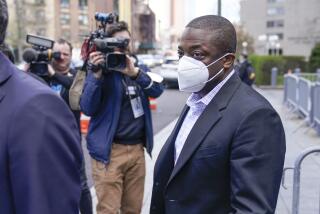Politicians Grist for Mill as India’s Watergate Flows On
- Share via
NEW DELHI — Already, some are calling it India’s Watergate. But in this subcontinental version of the American political scandal of the century, politicians from both leading parties have been implicated.
With nationwide elections only three months away in India, a messy and widening probe into high-level official corruption has shaken the usually smug ruling circles of the world’s largest democracy with the punch of a monsoon thunderclap.
On Thursday, President Shankar Dayal Sharma accepted the resignations of three Cabinet ministers. The president of the leading opposition party in parliament had resigned earlier.
All told, nine politicians of national stature have been accused by investigators of receiving some of the $18.3 million in hawala--laundered money or illegal foreign exchange--that investigators say was shelled out. More charges are in the offing.
The anti-corruption investigation and an order to press on from the Supreme Court to the Central Bureau of Investigation, which is responsible for the probe, are a blast of fresh air in a political setup in which the powerful seem to live by their own rules.
The charges serve notice “that in this country it is the rule of law that has to prevail, and not of those who have come to acquire a stranglehold on the political system,” thundered H. K. Dua, editor of the Indian Express newspaper.
The case is based on diaries seized in March 1991 from the residence of two high-living New Delhi brothers and businessmen, S. K. Jain and J. K. Jain, who are said to have been involved in illegal money laundering.
The confiscated records indicated that 115 Indian politicians and bureaucrats, sometimes identified only by their initials, received payoffs for help in landing contracts in the power, coal, steel and railway sectors from 1988 to 1991.
On Wednesday night, Agriculture Minister Balram Jakhar, Human Resource Minister Madhavrao Scindia and Parliamentary Affairs Minister V. C. Shukla resigned after the Central Bureau of Investigation made clear its wish to prosecute them for violations of the Prevention of Corruption Act. All protested their innocence.
Charges were brought against Arif Muhammad Khan, a former energy minister; Yashwant Sinha, a former finance minister; Devi Lal, a former deputy prime minister; Lal’s nephew Pradeep Singh; and Kalpnath Rai, a former food minister. The Jain brothers and eight civil servants were charged in the case in November.
Lal Kishanchand Advani of the nationalist Bharatiya Janata Party, which is the top challenger to Prime Minister P. V. Narasimha Rao’s Congress (I) party, was charged with having pocketed $172,000 in “illegal gratifications.” Advani quickly resigned his parliamentary seat and announced he will not run for reelection until his name is cleared in court.
In addition, Arjun Singh, the leader of a group that splintered from the Congress party--and a potential rival to the prime minister--was charged with accepting $28,700.
Most of the politicians questioned in the case have claimed the “donations” they received were passed on to the coffers of their parties.
It was the arrest in New Delhi of two students with links to Kashmiri separatists five years ago that led police to illegal money launderers and set them on the trail that ended at the Jains’ farmhouse.
“As far as I know, Watergate was a far smaller crime,” said cartoonist-columnist Rajinder Puri, one of two journalists who in 1993 petitioned the Supreme Court to force a more energetic investigation. “President Nixon just lied to the people. Some of the money involved in this scandal appears to have gone to anti-national terrorists.”
More to Read
Sign up for Essential California
The most important California stories and recommendations in your inbox every morning.
You may occasionally receive promotional content from the Los Angeles Times.













